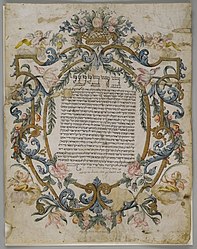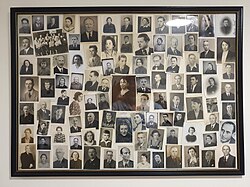
Synagogue records are an invaluable resource for Jewish genealogy researchers, offering a wealth of information about the lives of Jewish families and communities. These records can provide insights into the social, religious, and cultural aspects of Jewish life, as well as vital information about individual family members, such as names, dates of birth and death, and family relationships.
According to Dan Rottenburg, author of Finding Our Fathers: A Guidebook to Jewish Genealogy, “there are some synagogue-based records such as details of land holding, early cemeteries, minute books and occasional circumcision registers which do have distinctive Jewish links. In some cases, notably in those of long-established early Sephardi and Ashkenazi London Synagogues, the material is both extensive and very revealing.”[1]
In addition, there may also be records associated with the Yizkor (memorial) plaques hanging in most American synagogues. These plaques often contain birth date, death date and Hebrew names, often denoting a father and sometimes mother's Hebrew name. See JewishGen Memorials & Plaques Database.
History of synagogue records
Synagogue records have been kept since ancient times, with the earliest records dating back to the Second Temple period. During the Middle Ages, Jewish communities began to formalize record-keeping practices, with synagogues serving as the primary custodians of these records. These records were often written in Hebrew and Aramaic and were primarily used for religious and communal purposes.
As Jews began to migrate to new regions, synagogues continued to play an important role in record-keeping. In the 19th and early 20th centuries, as civil registration became more widespread, synagogues began to shift their focus to recording more detailed family information, such as marriages, births, and deaths.
Structure of synagogue records

The structure of synagogue records can vary depending on the region and time period. However, most records are organized by family or individual and include information such as:
- Names
- Dates of birth and death
- Marriages
- Divorces
- Family relationships
In addition to vital records, synagogue records may also include information about synagogue membership, charitable donations, and community events. These records may be written in Hebrew, Yiddish, or the local language of the region. Some synagogues even preserved photos.
Difficulties in researching synagogue records
One of the most significant challenges of using synagogue records for genealogy research is the language barrier. Many records are written in Hebrew or Yiddish, which may require specialized knowledge to interpret. In addition, some records may be written in outdated scripts, use unique abbreviations, or include information in local languages, which can be difficult to decipher.
Many synagogues have been happy to have their Yizkor (memorial) plaques photographed but some synagogues have not yet been willing to allow their plaques to be photographed.
Finding the records

Locating synagogue records typically begins with exploring your own family archive, where you may discover valuable hints and clues regarding the locations of your ancestors and their connection to specific synagogues. This initial step can provide a solid foundation for tracing your family tree and understanding your ancestral heritage.
Once you have identified the potential location of a synagogue connected to your family, the next step is to embark on the search for relevant records. If the synagogue still exists, there is a possibility that its archives retain historical documents, including vital records, membership lists, and communal records. Contacting the synagogue directly or reaching out to local Jewish organizations can often provide guidance on accessing these archives.
In cases where a synagogue no longer exists or its records are incomplete, researchers can explore alternative sources. Jewish museums and societies, country historical archives, and local archives can be valuable repositories of historical documents related to Jewish communities. These archives may hold records of births, marriages, and deaths, as well as synagogue-related materials such as administrative records, financial documents, and community publications.
Synagogue records in Europe
In Europe, particularly in Eastern Europe, many synagogues no longer exist due to various historical factors, including the pogroms, World Wars I and II, and the Holocaust. However, even in cases where synagogues have been lost, valuable synagogue records can often be found in various archives and Jewish heritage institutions throughout the continent. Here is a list of some European archives preserving the surviving Jewish records:[2]
Belgium
- The Jewish Museum of Belgium (Musée Juif de Belgique / Joods museum van België)
Czech Republic
- The Jewish Museum in Prague (Židovské muzeum v Praze)
France
- The Alliance Israelite Universelle (AIU)
Great Britain
- The London Metropolitan Archives
- The Scottish Jewish Archives Center
Greece
- The Jewish Museum of Greece
Hungary
- The Hungarian Jewish Museum and Archives (Magyar Zsidó Múzeum és Levéltár)
Italy
- The Contemporary Jewish Documentation Center (Centro di Documentazione Ebraica Contemporanea, or CDEC)
- The Historical Archive of the Jewish Community of Rome (Archivio Storico della Comunità di Roma “Giancarlo Spizzichino,” or ASCER)
- The Renato Maestro Library and Archive (Biblioteca archivio Renato Maestro)
Lithuania
- Wroblewski Library of the Lithuanian Academy of Sciences, Manuscript Department and the Lithuanian Central State Archives.
The Netherlands
- The Jewish Historical Museum (Joods Historisch Museum)
- The Jewish Museum (Jodiske Museet) in Trondheim
Poland
- The Żydowski Instytut Historyczny im. Emanuela Ringelbluma (Emanuel Ringelblum Jewish Historical Institute)
Romania
- Elie Wiesel National Institute for the Study of the Holocaust in Romania (Institute National Pentru Studierea Holocaustului din Romania “Elie Wiesel”)
Synagogue records in the USA
American Jewish Historical Society (AJHS) has synagogue records among its Institutional manuscript collections, which can be found by searching CJH’s online catalog.
- YIVO Institute for Jewish Research
- American Jewish Archives
- Jewish Theological Seminary, Joseph and Miriam Ratner Center for the Study of Conservative Judaism
- Yeshiva University Archives
- NYC Municipal Archives
Explore more about synagogue records
- How to Research Your Jewish Ancestors on MyHeritage at MyHeritage Knowledge Base
- Vital Records: How to Find Birth, Marriage & Death Records on MyHeritage Knowledge Base
- Slovakia, Church and Synagogue Books, 1592-1910 records collection at MyHeritage
- Canada, Montréal Jewish Synagogue Vital Records at MyHeritage Blog
- MyHeritage Adds 28 Collections of Jewish Historical Records at MyHeritage Blog
- JewishGen Memorial Plaques Database records collection at MyHeritage
- Community database at JewishGen
- Unearthing Israel’s Ancient Past: The Stunning Mosaics of Huqoq on the MyHeritage blog
References
- ↑ Dan Rottenberg. Finding Our Fathers: A Guidebook to Jewish Genealogy - USA, 1977
- ↑ https://www.jewisharchives.org/guide/directory/europe/